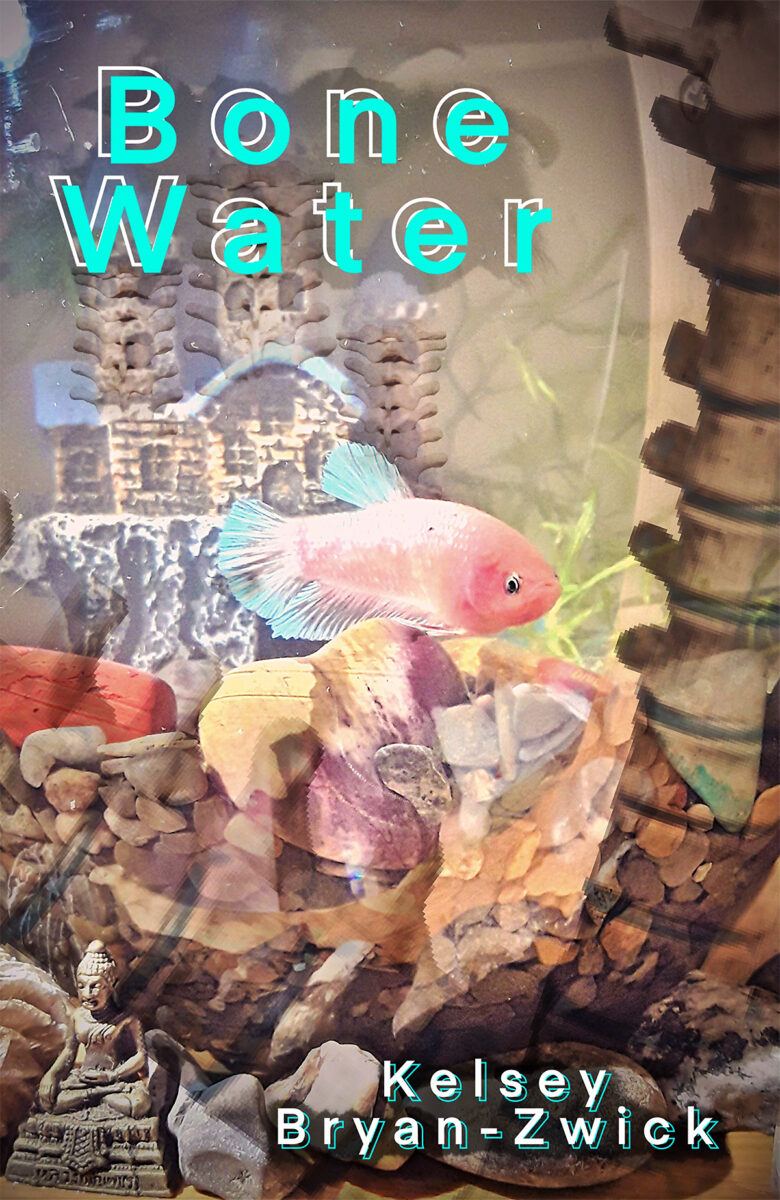My scar, now multiple surgeries deep,
marks the path I walk, the miles
to go before I sleep, the hours
I’ve had to cry, sweat, bleed, beg
this life for another chance.
(“New Love”)
The micro-chapbook Bone Water by Kelsey Bryan-Zwick (Blanket Sea Press 2021) is a about a person in pain suffering from scoliosis, that is, abnormal spine curvature. The pain stems from the curvature itself combined with the aftermath of complicated corrective surgeries. The 15 short, gem-like poems in Bone Water introduce us to the world of those who must live with oppressive chronic pain if they wish to live at all.
The speaker in Bone Water asks us readers in effect to “walk a mile in my shoes,” while pulling no punches as to how stressful it might be to keep wearing those shoes and keep walking that walk. For example, the speaker tells us: “…[T]he doctors explain the risks—explain the need to once / again sharpen their knives” (“Scoliosis”). As a result of that particular surgery, the speaker has a long scar that is “somehow /… m / i / n / e” (“Under the Bone Saw”).
The speaker adds, just in case we think that the surgery might have been unnecessary:
Before my scar, my spine was so bent up in double
curve that I grew inches on the operating table
as I unfurled like a leaf.
(“Under the Bone Saw”)
The speaker’s spinal condition is idiopathic, meaning (to me, at least) that medical experts don’t presently agree on what causes it. The result is that the speaker’s scoliosis is:
without cause, or known reason
no antidote, no cure, no vaccine…
without rhyme or care for an exit.
(“Idiopathic Curvature”)
In order to live while retaining a shred of dignity and self-esteem, the speaker tells us that she channel[s] her “inner tortoise,” which provides some protection with its hard shelled armor, its “…skin an ancient leatheriness” (“Self-Portrait”). As a result, “I sleep deeply below ground.….” This enables the speaker to avoid self-pity: “I only ever weep / when it is raining” (“Self-Portrait”).
In an important, powerful short poem, Bryan-Zwick’s speaker depicts the surgeries as a kind of kintsugi (the process of repairing pottery with gold) (“Kintsugi”). Accordingly, during the surgery, the surgeons metaphorically “pour in rare metals, trying to keep me whole / enough to hold my own water, my own blood” (“Kintsugi”).
The related concept of wabi-sabi might also apply here. The philosophy behind wabi-sabi is that there is a kind of beauty to be found in people and things that are old, worn-out, or flawed. Beauty doesn’t need to be perfect. Take Robert Herrick’s viewpoint. In the poem “Delight in Disorder,” his speaker is bored by perfection, but intrigued when a woman lets her appearance subtly suggest that underneath her prim exterior, she’s wild and wanton—by leaving a strategic button undone, for example.
Everyone ought to read this book—because everybody suffers pain sometimes—although to what extent that’s true depends mainly on how lucky you are—and because reading Bone Water might help readers put their own suffering and the suffering of others into perspective.
I have the impression that the poems in Bone Water by Kelsey Bryan-Zwick could have been depressing, but they’re not. On the contrary, these poems are uplifting, a testimony to the triumph of the human spirit. I’m reminded of Maya Angelou’s iconic piece “Still I Rise,” where the speaker exhorts us to overcome obstacles by believing in our own worth—these words apply: “You may trod me in the very dirt / But still, like dust, I’ll rise.”

